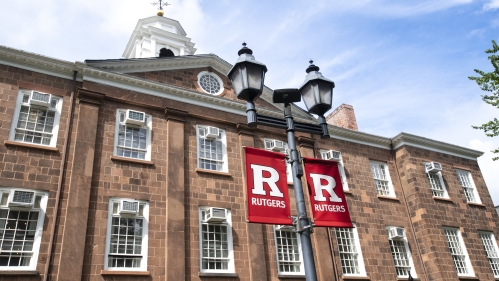
Bias Outreach, Restoration, and Education
Rutgers University-New Brunswick is committed to creating a welcoming, inclusive, and respectful beloved community where everyone can thrive and do their best work. If you experience, witness, or are aware of a bias incident, submit a report to alert the university.
If you are unsure what to do, you can Request a Consult to talk through your options.
To file a report with your name and contact information, click on the link below. | To file a report anonymously text 848-315-1766 or scan the QR code below. Your name and contact information will not be revealed unless you decide to share it.
|
After you submit a report, you’ll get an automated message confirming we received it. A member of the Bias Cares Team will then review your report. You’ll only be contacted if we need more information from you. Otherwise, the Bias Cares Team will reach out directly to the impacted party(ies) to offer support and resources.
Rutgers University believes in the free expression of ideas by community members
All members of the Rutgers community are free to express their viewpoints in public forums as private citizens, including viewpoints that may be perceived by others to be unwelcoming or intolerant. We do not restrict the activities of recognized university organizations, including the speakers they invite to campus if these organizations obey the law and follow University policy and guidelines regarding these events.
Acts of bias can be disruptive. However, bias incidents may not always violate civil, criminal or University codes and will not necessarily result in discipline.
What do we mean by bias?
Bias consists of prejudice for or against a person or community, usually considered unfair.
A bias-related incident is an act, motivated in whole or in part by prejudice against a person or group, based on a person or community’s actual or perceived identities.
What we can do through the bias response process
When a report is submitted, the Bias Cares Team reaches out to impacted parties to offer support and resources. The team seeks to prioritize a reporter's well-being, health, and safety, and connects them to university resources that can offer more specialized support.
The Bias Outreach and Response (BOR) team then carefully evaluates the report to identify needs and actions. This team looks to provide a response that tries to repair harm and educate community members. When evaluating a bias incident, the Bias Outreach and Response team can:
- Send resources to address vandalism, graffiti, or damage to property
- Facilitate restorative processes to mend organizational and intergroup conflict
- Facilitate education and dialogue
- Coach faculty members, students, and staff
- Refer bias reports to other university offices for investigation and follow-up
- Allow reporters to inform what next steps they wish to undertake, unless it conflicts with mandatory reporting requirements
What we cannot do through the bias incident response process:
There are limits to what the Bias Outreach and Response Team can do when responding to bias incident reports. While the team may recommend policy and practice changes, provide care, and facilitate learning, the Bias Outreach Team cannot:
- Propose or facilitate formal discipline of faculty, staff, or students
- Terminate faculty and staff
- Expel or formally discipline students
- Censor or punish people for offensive or repugnant comments that are protected speech
- Change curriculum
- Investigate or make any findings of fact
- Replace hard conversations between faculty, staff and students
What You Can Expect
A campus team of trained university officials privately reviews all submitted bias incident reports with responses no more than five business days of reporting an incident.
The university's response includes
- Conversation(s) centered around the incident and impacted person(s)
- Refer reporter to appropriate campus offices that can effectively respond
- Refer impacted to support resources
- Incident assessment, response plan
- Ongoing support and check-ins
Possible outcomes include
- 1-on-1 ongoing support
- Engage person(s) impacting others
- Engage leaders to address systemic issues
- Restorative justice conference or circles
Looking for other options for reporting?
If you are looking to report a student conduct violation, academic integrity violation, sexual misconduct report, mental health report use this link.
If you are still unsure what to do, we encourage you to request a consultation to talk through your options.
What is Restorative Justice?
Restorative Justice (RJ) is a set of principles and practices inspired by indigenous traditions used to build community, address harm, and aid in healing. RJ often leads to a positive transformation of people, relationships, and communities. The Division of Student Affairs at Rutgers University—New Brunswick offers a variety of RJ practices and processes. Click here to learn more about the services we offer at Rutgers and click here to request services.

